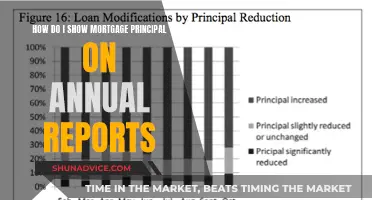
Taking a break from your mortgage, also known as a mortgage holiday, can be a helpful option if you're struggling to make payments. A mortgage holiday allows you to temporarily stop or reduce your monthly payments. However, it's important to note that interest will continue to accrue on your debt, resulting in higher monthly payments and a longer repayment period. Before taking a mortgage holiday, ensure you understand the terms and conditions of your mortgage agreement, as eligibility depends on factors such as your repayment history, financial difficulties, and the loan-to-value ratio of your mortgage. Additionally, consider seeking advice from a mortgage specialist to explore alternative options and potential costs associated with breaking your mortgage contract.
How to take a mortgage break
| Characteristics | Values |
|---|---|
| Who can take a mortgage break? | Those who have made a minimum number of repayments, have a history of overpayments, or are experiencing financial difficulties. |
| How to take a break? | Contact your lender to discuss eligibility and apply. Many lenders also have online applications. |
| What happens during the break? | Interest will still build on your mortgage debt, increasing the amount you owe. |
| What happens after the break? | Your monthly payments will be recalculated and will likely increase. |
| What are the consequences? | A mortgage holiday shouldn't negatively impact your credit score, but it could affect your ability to get a mortgage in the future as lenders may infer financial struggle. |
| Alternatives | Discuss with your lender to pay a proportion of your monthly payment, switch to an interest-only mortgage, or shop around for a cheaper deal. |
What You'll Learn

Contact your lender to discuss options
If you're struggling to make your mortgage payments, you should contact your lender as soon as possible to discuss your options. Many lenders will be willing to help you find an alternative solution, such as reducing your monthly payments for a short period of time. It's important to note that your ability to take a break from your mortgage repayments will depend on the terms and conditions of your mortgage agreement. Some lenders, for example, will only allow a mortgage holiday if the loan-to-value of your mortgage is lower than 80%. Additionally, you usually need to have made your mortgage repayments for a set period, typically 12 months, before you qualify for a payment holiday.
Before you contact your lender, it's a good idea to do some research and consider your options. For instance, you could switch to an interest-only mortgage, which would considerably reduce your monthly payments. Alternatively, you could look at extending the mortgage term, which would lower your monthly payments but result in you paying more overall due to interest. If you have made overpayments in the past, you may have built up enough credit to take a break from your repayments.
If you are considering breaking your mortgage contract, it's important to understand the potential costs. In some cases, you may have to pay a prepayment charge. However, if interest rates have dropped since you signed your contract, you may be able to renegotiate a new contract with your current lender at a lower rate. This could save you money, but you should be sure to include all fees in your calculations when comparing your options.
When you contact your lender, they will assess your situation and make a decision. Many lenders have an online application process that you can go through before speaking to someone on the phone. Whatever you do, don't stop your direct debits without speaking to your lender first, as this will be counted as a missed payment and could impact your credit rating.
PNC Mortgage Balance: Viewing Your Account Details
You may want to see also

Understand the impact on your credit file
Taking a mortgage break, also known as a "mortgage holiday", can impact your credit file. A mortgage holiday is an agreement with your lender to pause or reduce your payments for a set period. While an arranged mortgage break may not directly impact your credit score, it can affect your ability to obtain credit in the future.
Firstly, it's important to understand that different lenders have varying criteria for mortgage holiday eligibility. Some common requirements include being up-to-date with your payments and having a loan-to-value ratio below a certain threshold, typically 80%. During the mortgage break, interest continues to accrue, and your lender may increase your monthly payments after the break to compensate for the missed payments and additional interest.
The impact of a mortgage break on your credit score depends on how you manage your finances during and after this period. If you are unable to keep up with the increased payments after the break, it could lead to missed payments, which can significantly harm your credit score. Lenders may view this as a red flag and consider you a higher-risk borrower. Additionally, if you have a high credit score before taking the mortgage break, you may experience a more noticeable drop in your score due to the increased debt-to-income ratio.
To minimise the negative impact on your credit file, it is crucial to understand the terms of the mortgage break with your lender. Ask your lender if the arrangement will be reported as missed payments on your credit file, as this can vary. Even if a lender does not report the break, your credit score could still be affected by the increased payments after the break. Therefore, carefully consider your ability to manage these higher payments to maintain a positive credit history.
In summary, while a mortgage break itself may not directly impact your credit score, it can have indirect effects. These include higher monthly payments after the break and potential challenges in managing your overall finances, which can influence your creditworthiness.
Settling a Charged-Off Second Mortgage: What You Need to Know
You may want to see also

Payment holiday eligibility
History of overpayments
If you have overpaid your mortgage in the past, some lenders will let you use that buffer to cover your monthly payments until it’s all used up. This could be a good option if you are taking a short break from work or going on maternity leave. However, this may still impact your credit report, so check with your lender about how they report it on your credit file.
Experiencing financial difficulties
If you are struggling to meet your monthly repayments due to a change in circumstances, such as redundancy or a relationship breakdown, your lender may offer you a payment holiday. Lenders can agree to a pause in mortgage payments for a specified amount of time, usually from one to 12 months. It is important to note that you will need to provide full details and documentation to support your application.
Made a minimum number of repayments
To be eligible for a payment holiday, you usually need to have made your mortgage repayments for a set period, typically between 6 and 12 months. This demonstrates that you have been consistently making payments on time and are generally financially responsible.
Meet your lender’s LTV requirements
Some lenders will only allow a mortgage holiday if the loan-to-value (LTV) of your mortgage is lower than 80%. This means that the loan amount is significantly less than the value of the property. It indicates that you have built up some equity in your home and are a lower-risk borrower.
It is important to remember that while a mortgage holiday can provide temporary relief, it is not free money. Interest will continue to accrue on your outstanding loan balance during the holiday, increasing the total amount you owe. Additionally, it is crucial to communicate with your lender and understand the potential implications of a payment holiday on your credit score and future borrowing ability.
Transferring Your Mortgage: Signing Over to Your Son
You may want to see also

Alternative solutions to payment holidays
If you are considering a mortgage break due to financial difficulties, it is important to know that there are alternative solutions to a payment holiday. Here are some options to explore:
- Discuss your situation with your lender: Contact your lender as soon as possible to discuss your options. They may be willing to work with you to find an alternative solution, such as reducing your monthly payments temporarily or allowing you to pay a proportion of your monthly payment. Lenders are often keen to help and come to an agreement that works for both parties.
- Shop around for a cheaper mortgage deal: If you are not in arrears but are finding it challenging to meet your repayments, consider looking for a more affordable mortgage deal. Compare the costs and benefits of different lenders and see if switching to another lender could save you money.
- Negotiate a lower interest rate: If interest rates have dropped since you signed your mortgage contract, consider renegotiating with your current lender for a lower interest rate. Keep in mind that breaking your mortgage contract may incur fees, so ensure that the benefits outweigh the costs.
- Build up overpayments: If you anticipate a temporary drop in income, you can prepare by building up overpayments. By paying more than your agreed monthly payments, you can accumulate enough credit to cover a break from repayments in the future.
- Seek financial advice: Speak to a financial adviser or broker to explore other financial solutions that may be better suited to your circumstances. They can help you navigate unsecured forms of lending or provide guidance on mortgage restructuring.
Remember, while a mortgage holiday can provide temporary relief, it is not without its costs. Interest will continue to accrue during the holiday, resulting in higher monthly payments and a longer repayment period overall. Additionally, it could potentially impact your future borrowing ability, even if it is not recorded as a missed payment on your credit file. Therefore, it is essential to carefully consider all alternative solutions before opting for a mortgage break.
Strategies to Reduce Your Mortgage Quickly and Efficiently
You may want to see also

Renegotiating your mortgage contract
Understand your mortgage agreement
Before making any decisions, it's crucial to understand the terms and conditions of your mortgage agreement. Some lenders offer flexible payment options or mortgage holidays without imposing prepayment charges. Review your agreement to determine if you have an open or closed mortgage and the associated prepayment privileges and penalties.
Contact your lender
If you're facing temporary financial difficulties, such as redundancy or maternity leave, reach out to your lender as soon as possible. They may be willing to work with you to find a solution, such as a mortgage holiday or reduced payments, to help you through the challenging period. It's important to note that you may need to have made a minimum number of repayments, typically for about 12 months, to qualify for a mortgage holiday.
Assess your options
Before taking a break from your mortgage, evaluate the costs and benefits of breaking your contract. Compare these against other alternatives, such as switching to an interest-only mortgage for a period or shopping around for a cheaper mortgage deal. Remember that breaking your contract may incur fees, and you'll usually have to pay setup fees when establishing a new mortgage.
Consider the impact on your credit score
While an official mortgage holiday arranged with your lender won't be recorded as a missed payment, it could still affect your future ability to get a mortgage. Lenders consider various factors when making lending decisions, and they may interpret gaps in your payment history as a sign of financial struggle. Ensure you understand the potential consequences on your credit file before deciding.
Interest accumulation
Keep in mind that during a mortgage holiday, interest continues to accrue on your outstanding balance. This means that when the holiday ends, your monthly repayments will be higher, and it will take you longer to repay your mortgage in full. If possible, continue making payments during the holiday to minimise the impact of accumulated interest.
Removing an Ex-Spouse from a Joint Mortgage
You may want to see also
Frequently asked questions
Contact your lender to discuss your options. You may be able to temporarily stop or reduce your monthly repayments. This is known as a mortgage holiday, and it's important to note that interest will still build on your mortgage debt.
A mortgage holiday can relieve some pressure by giving you greater flexibility with your finances. However, it is not a cost-free option. Interest will continue to accrue, meaning your monthly payments will be higher when you restart them, and it may take you longer to clear your mortgage. It could also affect your ability to get credit in the future.
The criteria vary depending on your lender. You may need to have made your mortgage repayments for a set period, usually 12 months, and some lenders will only allow a mortgage holiday if the loan-to-value of your mortgage is lower than 80%. It's also important to note that if you're in mortgage arrears, you may not qualify for a mortgage holiday.







